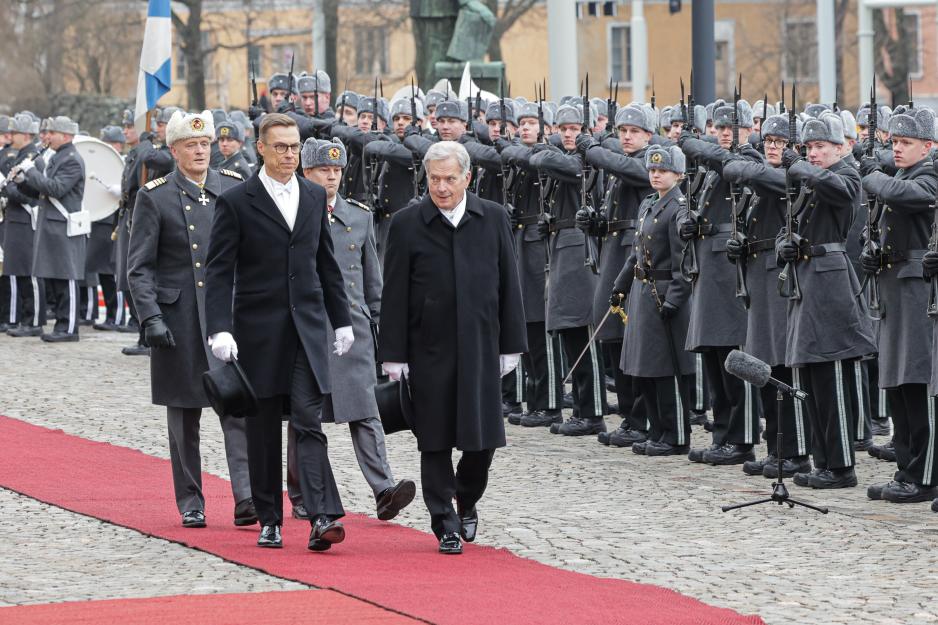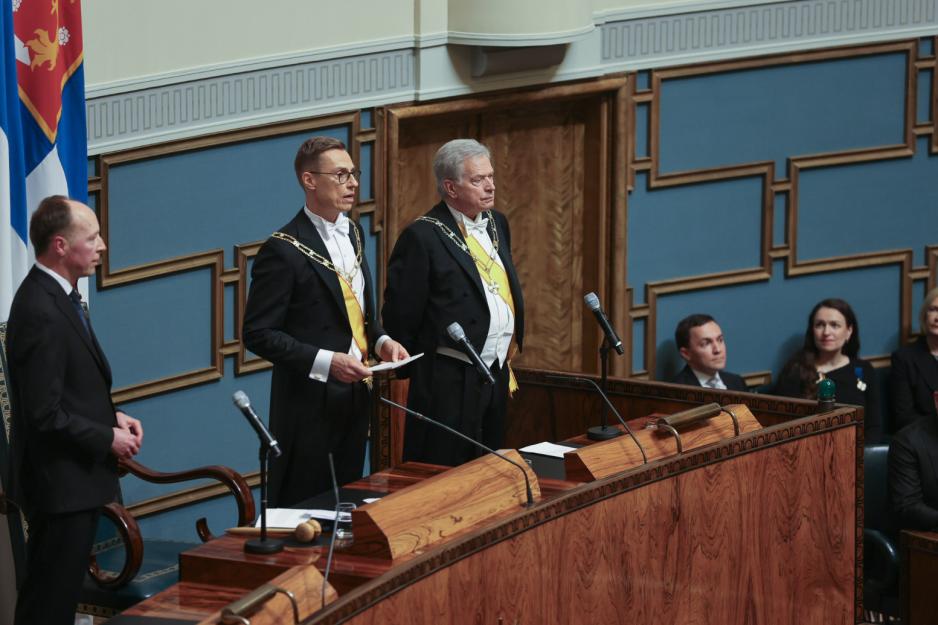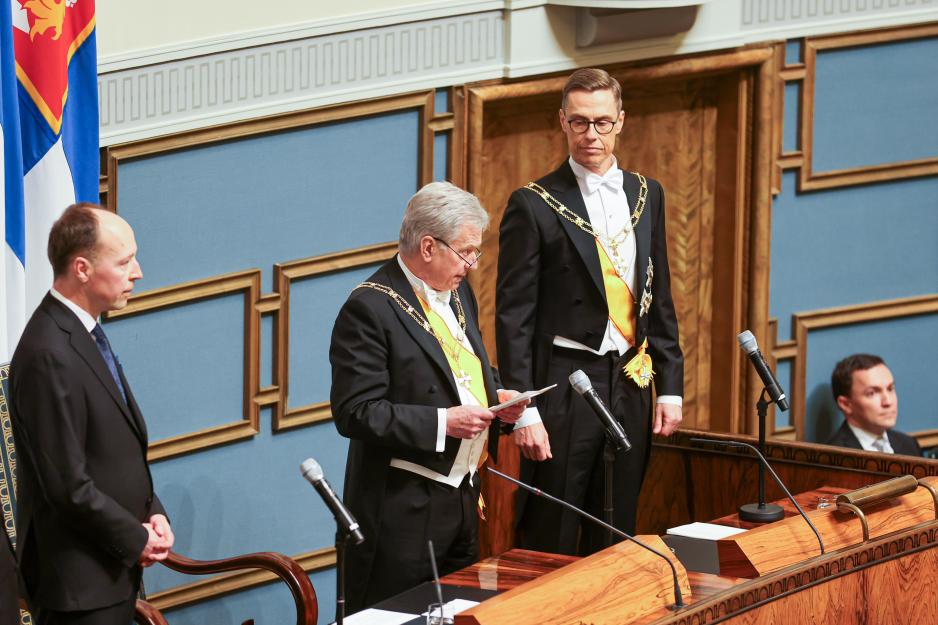Finland’s new president: “Fear is the worst possible guiding principle in foreign policy”

The presidency of Finland was recently handed over from Sauli Niinistö to Alexander Stubb. With an allusion to the behavior of neighboring Russia, both emphasize the importance of keeping a cool head regarding foreign and security policy.
On Friday, Alexander Stubb became Finland’s new president. He replaced Sauli Niinistö, who had held office for 12 years.
In his inauguration speech, Stubb thanked his predecessor for leading the country through turbulent times.
He likely refers in particular to the period from December 2021 in which Russia demanded a full stop in NATO’s eastern expansion, including in the Nordic region, and that Finland and Sweden could not receive military support from the alliance.
In February 2022, the Russian full-scale invasion of Ukraine followed, and both Finland and Sweden applied for NATO membership in the spring.
Naturally, the new president also looks forward.
“We are now facing a new era. By allying ourselves militarily and joining NATO, we have taken the final step into the Western community of values, to which the Republic of Finland has belonged in spirit throughout its independence,” he says.
As part of the new era, Stubb and Norwegian Prime Minister Jonas Gahr Støre visited Alta, Northern Norway, on Thursday to meet the forces taking part in Nordic Response – the large-scale allied military exercise now taking place across northern parts of Norway, Finland, and Sweden. The two heads of state also had a bilateral meeting.
Finland’s semi-presidentialism in short
– In Finland, presidential rule and parliamentarism are combined. The president and the government share executive power.
– The president is elected by direct election for six years at a time and can be re-elected once. The government has its basis in the parliament, the Eduskunta, which is elected every fourth year.
– The president leads Finnish foreign and security policy in collaboration with the government. Eudskunta approves international commitments. On matters of war and peace, the president, who is also the highest commander of the Finnish Armed Forces, makes decisions with Eduskunta’s consent.
– The president could also dissolve the parliament and call for a new election, reject or revise bills presented by the government, and refrain from ratifying laws that have been adopted. The president exercises most such powers in agreement with the government.
Value-based realism
In Finland, the president has major power of definition over the country’s foreign policy line and initiatives, and Stubb signals continuity in that context:
“Finland’s foreign and security policy is founded on value-based realism. Its starting point is a strong alliance with the European Union and NATO. At the same time, it is based on the belief that the foundation of the new international system and peace lies in reforming and strengthening the UN”, he says and continues:
“Our foreign policy is has its firm base on Western values, including democracy, the rule of law and human rights. We believe in cooperation and the rules-based international system.”
“At the same time, our security policy is based on realism. That is why we maintain a strong defense capability – now, as part of a military alliance. It is also realism to understand that the great global challenges cannot be solved only between like-minded countries.”

Calm and restrained
Stubb points out that today’s world is characterized by unrest, disorder, and significant change with uncertain outcomes. This is not only regarding the development of a new power balance and world order but also regionally in terms of the security situation in Europe.
“Even though the world seems to be in chaos right now, we should not despair. Fear is the worst possible guiding principle in foreign policy. Yes, we will come to see strategic competition. Yes, we will come to see local, even regional conflicts. But the need for cooperation will not go anywhere. It will only change its form,” the president maintains.
“We will be facing things we are not used to. And uncertainty, which may sometimes even scare us. However, we must not react to every little noise. In foreign and security policy, it is always advisable to remain calm. But let us prepare ourselves also for the fact that sometimes we need to react rapidly to changing circumstances, as we did with NATO membership,” he continues.
“We must work for peace as well.”
War and peace
The new Finnish president also articulates what can be read as a contribution to the Western conversation about military rearmament and civil preparedness.
In particular, Sweden’s defense leadership and NATO’s military leader have advocated that one must prepare for a possible major European war—both at the societal and individual levels.
“Lately, the public debate and rhetoric have been belligerent. We are talking a lot about weapons, munitions, and armies. This, of course, derives from the fact that we live in a world where there are wars going on in Europe, the Middle East, and Africa,” Stubb says.
“However, this bellicose rhetoric must not overshadow the fact that we Finns are a peace-loving nation. Or the fact that the main duty of the President of the Republic under any circumstances is to ensure that we in Finland can live in peace. This, I promise to do. However, if push comes to shove, I am ready to make difficult decisions to ensure the security of our country,” he points out and continues:
“We must work for peace as well. President Martti Ahtisaari was one of the most significant peace mediators in world history. We must cherish and carry on his legacy. Whenever we are given an opportunity to mediate peace, we will be ready for it. Alongside diplomacy, another critical element of maintaining peace is the readiness and capabilities of the Finnish Defense Forces.”
When we proceed, we do it after careful consideration.
Careful consideration
Sauli Niinistö also gave his concluding speech on Friday, reflecting on the past two years in particular.
“Everything has changed, and nothing has changed,” Niinistö begins.
This paradox serves as a framework for the entire speech, in which he, among other things, points to the following:
“Russia’s cruel invasion of Ukraine in the early years of this decade dramatically changed the security situation in the whole of Europe. Finland responded by joining NATO and continued by negotiating the defense cooperation agreement with the United States. Even though the agreement is bilateral, it has clear interactions with other similar agreements.”
In December, Finland and Sweden signed bilateral defense cooperation agreements (DCA) with the US. Norway and the US have agreements on defense cooperation that stretch back to 1950 and 2022, respectively. In February, the two countries also signed a re-negotiated supplementary defense agreement.
Niinistö continues:
“All this has been done almost unanimously. I have considered it a value in itself that when we proceed, we do it after careful consideration, avoiding any conflicts. As a small country, we really cannot afford them. Perhaps, every now and then, it has fallen on me to seek mutual understanding, sometimes even within governments, often also listening to the parliamentary opposition.”

Right timing for joining NATO
By extension, the former president points out that many believe Finland should have applied for NATO membership a long time ago.
“This kind of thinking was valuable. However, there would have been no consensus behind that view, hardly even a majority, before the spring of 2022. In retrospect, we could say that we applied when it turned out to be necessary. In addition, it also appears that we lost nothing irreplaceable before that,” Niinistö says.
“The most valuable part of all this has been the fact that we maintained and developed our defense for many decades in such a manner that, today, our new NATO partners seem to regard us as an example. The basic structures of Finnish security are now in as stable positions as can be. Within them, the operating models and ways of working are under careful consideration. Taking care of them is the next task.”
High time to awaken
Niinistö also leaves the presidency with some reflections on today’s foreign and security policy situation.
The primary reference is Donald Trump’s recent statements about NATO in the American presidential election – such as encouraging Russia to attack member states that do not contribute enough financially to the alliance.
“At the moment, due to the US elections, there is concern about the future of NATO. The comment “they must pay their bills” was probably drafted for domestic use, but there are many reasons why the European partners should also hear it. It is high time to awaken to securing the state of peace, in other words, to strengthen ourselves.”
“What is certain, though, is that everything will keep on changing. And perhaps even at a more rapid pace than before. It requires a flexible and rapid ability to adapt oneself. That is something Finland has had, for example, when seeking NATO membership. Another thing that is certain is that a lot will remain unchanged. The human mind, that is. Diplomacy is still also a solo sport that requires discretion. That way, even small countries can get their voice heard,” Niinistö maintains.
High North News is an independent newspaper published by the High North Center at Nord University in Bodø, Norway.